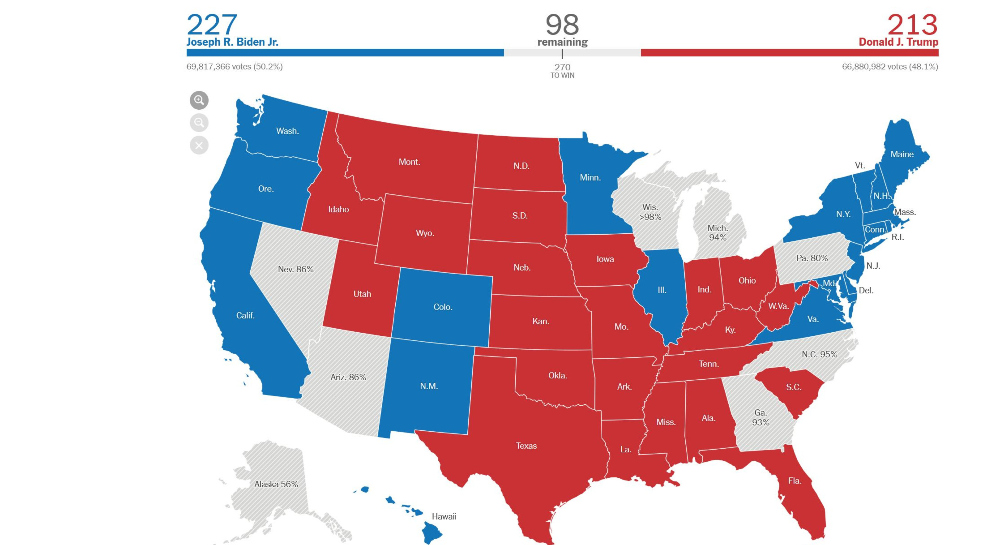
Excuse the bleary vision, but here are some early takeaways from the election.
1. Polls. Wrong again, though it looks like the Biden Team had a much more accurate reading of the electorate and the close races. As in 2016, the late votes broke in Trump’s direction. One suspicion: when polls show a wide lead for one candidate, those voters relax while the underdog gets motivated. Thus the predicted Blue Wave turned into the Blue Ripple.
2. Incumbents Rule. I expected a tide of tossing out incumbents, given all the discontent with government polarization and inaction. Not so fast. Nearly all incumbents in this state prevailed; even the embattled Mayor Ted Wheeler of Portland seems to have survived. And many U.S. Senators got reelected, despite their toadying to Trump.
3. Trump Voters. Not going away, not sobering up, expanding and militant, not understood by the mainstream media. Some mobilizing factors: fear of government expansion, verging on socialism; too many scary “Portland” images; the stress on equality by liberal programs, suggesting limits on individualism and freedom; widening appeal of masculine messaging, now extending to Black and Hispanic males.
4. Progressive Fizzles. Where there were showdowns between moderate Democrats and further-left versions, the latter mostly lost. Examples in this state: lieutenant governor (Denny Heck won easily); 10th Congressional race (Marilyn Strickland prevailed). An exception, really a sign of labor strength, was the tiny lead of Ingrid Anderson over moderate Sen. Mark Mullet (D-Issaquah).
5. GOP Fizzles. There were some races that could have been a barometer for Republican revival, but no such evidence. Loren Culp’s better-than-expected 40.4% showing against Gov. Jay Inslee I read as more of a send-a-message vote. Battling sex education, including the superintendent of public instruction, made little headway. Secretary of State Wyman got a scare and Republican state Treasurer Duane Davidson got shown the door. The 8th C.D. is now lost for good (pending redistricting). More years in the wilderness for the state GOP.
6. In a Rut. Just as the 2016 presidential election stayed very much in the channels of the 2012 election, so it happened this year. The nation is polarized, tribalized, resembling the trench warfare of World War I. Hopes of really changing the South were dashed. The Southwest (Nevada, Arizona, New Mexico, Colorado) are increasingly extensions of California, as the West Coast expands into the Southwest. The closeness of races in Texas, Georgia, North Carolina, and Florida will prompt Republicans in those states to tack toward the center. Also striking is how divided are individual states (including Washington and Oregon), with the fault lines being the large metro areas and suburbs versus “upstate.”
7. Hedging Bets. Overall, I read the election as overwhelmed voters ratifying the American system of checks and balances. Get rid of Trump, but keep the GOP Senate and the Supreme Court. Protect minoritarian rule by supressing votes and protecting the skewed system of the Senate and the Electoral College. Vote for stalemate and then complain about inaction!
Discover more from Post Alley
Subscribe to get the latest posts sent to your email.

Sometimes suspense brings some good news, even when it’s urban libs like us in suspense, and clueless. We didn’t get the landslide we thought we needed, and the Electoral College has provided cover for the historic right and also the radical right co-opted by Trump. Not now. States seem to be asserting control. Maybe we can learn to like constitutional democracy after all.
If our political parties decide that it’s important to create a more collegial legislative environment there ARE some actions they could take. For example, why not:
1) Acknowledge that some apologies are in order – then MAKE those apologies?
2) Ask Voters what the Parties can do to rebuild trust – in our political process, in party platforms, AND in our candidates?
3) Reduce the fundraising requirements for elected representatives by 50-75%?
4) Allow elected representatives to vote across party lines without the fear of losing their Party’s financial support?
5) Stop using data collected by Facebook, Google, and others to “micro target” political messages to single-issue voters?
6) Create a bi-partisan Congressional redistricting methodology, with the goal of ending gerrymandering?
7) Collaborate to recruit qualified candidates for non-partisan positions like Judge, City Attorney, Treasurer, or County Prosecutor?
8) Allow Presidential Primary voters to rank their first, second, and third choices – then let the Presidential primary process play out – without Party interference?
9) Allow the Press to cover stories about political party decisions, for example, a story about the reason so many Democratic candidates suddenly withdrew from the 2020 Democratic Presidential Primary – and who offered them what in return?
10) Create a report card for elected representatives and party officials. Rank their performance based on: votes cast AND evidence of bad behavior, i.e., propensity to interrupt others when it’s the other person’s time to speak, propensity to ignore the question they were asked during a debate, and propensity to engage in nepotism, influence pedaling, discrimination, sexual harassment, disinformation campaigns, and the like?
11) Run Party Meetings (including caucuses) using video conferencing software, so that journalists and ordinary citizens can observe how Party decisions are made, participate in polls, and ask questions?
If either Party is considering a truce, perhaps they’ve already considered these ideas – or have better ones. I’m discouraged, because the policies I envision would require the Parties to give up some control – and institutions rarely want to do that.